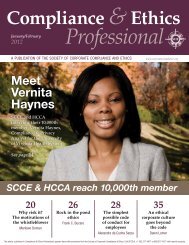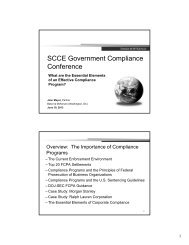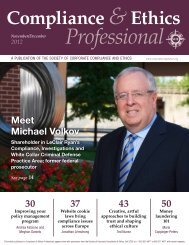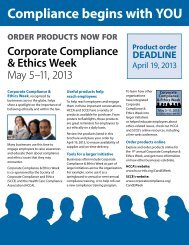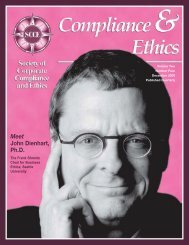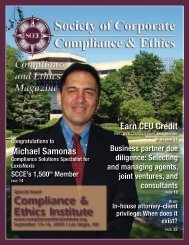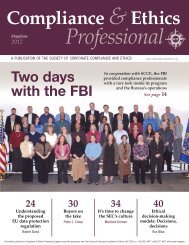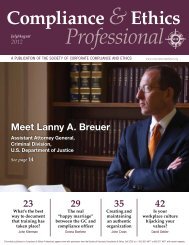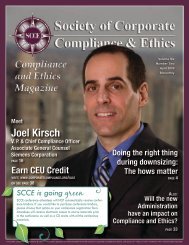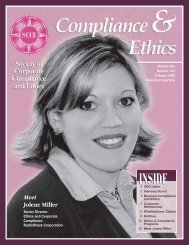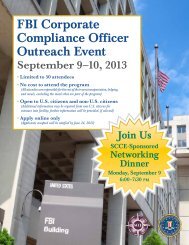Compliance & Ethics Professional - Society of Corporate ...
Compliance & Ethics Professional - Society of Corporate ...
Compliance & Ethics Professional - Society of Corporate ...
- No tags were found...
Create successful ePaper yourself
Turn your PDF publications into a flip-book with our unique Google optimized e-Paper software.
language issues come within three interlockingworlds: “English,” jargon, and “legalese.”“English”Open any dictionary at random, to any page,and you will see a basic truth: there are veryfew “simple” words. Most have more thanone meaning. In the heat <strong>of</strong> litigation, thosedifferences can be blown up in degree andsignificance. If the witness is not 100% clearabout how the questioner is using a word, theycannot answer the question. If they answer, thequestioner will assume their definition is theone in play.One common tactic is for questioners to tryto bully their way through language problems.Consider this exchange:Q: Who did you report to?A: Please rephrase the question.Q: What don’t you understand about myquestion?A: I’m not comfortable with “report.” Ihad consultants and investors, but“report” sounds like I’m in the Army.Q: You know what the word “report”means, don’t you?A: Well, yeah.The witness gave in to a question with theunspoken “you idiot!” at the end. Prepare thewitness by explaining that in such circumstances,the issue is not whether you’re toostupid to know what “report” means (which ishow the witness may feel); the issue is whetherthe questioner is too stupid to know that thedictionary has twenty-five different definitions<strong>of</strong> the word, and you didn’t know which one shemeant! Be sure you know, before you answer.JargonEvery pr<strong>of</strong>ession, industry, region, and endlessother categories, has its own language. Wecall it jargon. In Webster’s words, jargon is “thetechnical terminology or characteristic idiom<strong>of</strong> a special activity or group.” But like somany other words, jargon has multiple meanings.When Juror #6 hears jargon, it comesacross less as impressive technical know-how,and more like Webster’s next definition <strong>of</strong> theword: “obscure and <strong>of</strong>ten pretentious languagemarked by circumlocutions and longwords.” Witnesses need to work hard to stayaway from jargon, and to recognize when theyfall back into it, and stop to explain.“Jargon interferes withcommunication in so manyways. Jurors don’t understand it.They don’t like it and <strong>of</strong>ten feelit’s condescending. It can makethe witness seem cold anddistant, talking about humanissues in dehumanizing terms.”Jargon interferes with communicationin so many ways. Jurors don’t understand it.They don’t like it and <strong>of</strong>ten feel it’s condescending.It can make the witness seem coldand distant, talking about human issues indehumanizing terms. Lastly, its impact can g<strong>of</strong>ar beyond the words themselves: Juror #6 maymiss the next several minutes <strong>of</strong> testimony,because he is still trying to figure out thejargon, and eventually may turn <strong>of</strong>f entirely.Help your witness to understand what kind <strong>of</strong>jargon he or she speaks, and how to avoid it.“Legalese”In every case there are legal standards andconcepts that have to be broken down fromtheir confusing language, and explained inclear and simple terms. Counsel must helpthe witness understand what they are, so<strong>Compliance</strong> & <strong>Ethics</strong> <strong>Pr<strong>of</strong>essional</strong> March/April 2012+1 952 933 4977 or 888 277 4977 | www.corporatecompliance.org 41




